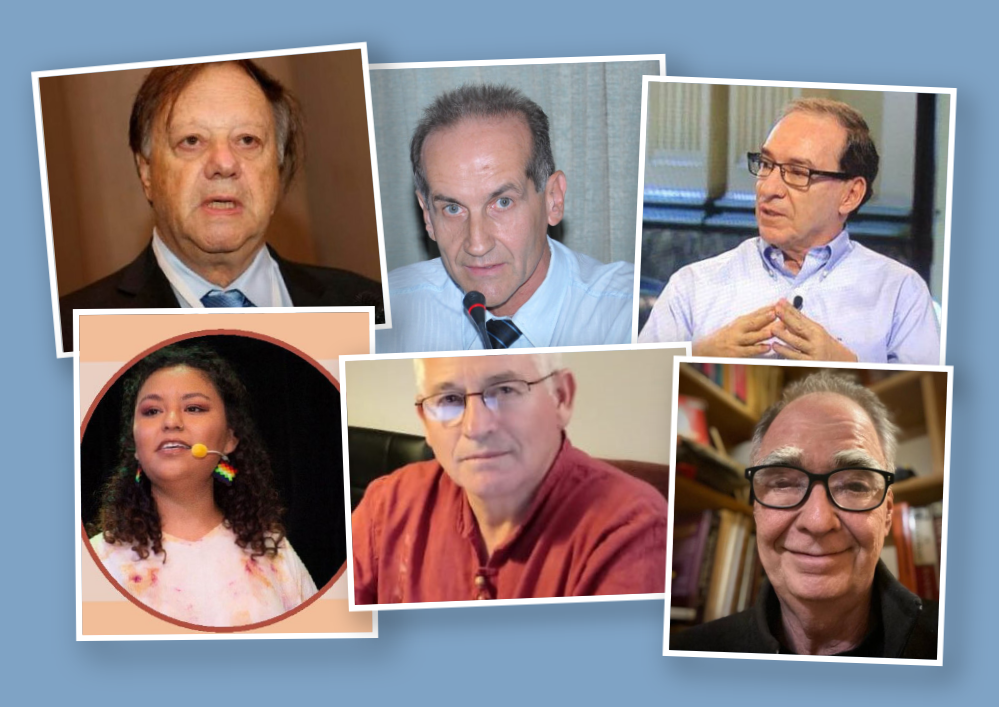The 10th Symposium has ended
From 8 to 11 May 2025, 142 authors and groups from 18 countries (Chile, Argentina, Italy, Peru, Colombia, Spain, Belgium, Mexico, Bolivia, Israel, Costa Rica, Ecuador, France, India, Uruguay, Brazil, Panama, United Kingdom) carried out 110 activities: presentations, round tables, workshops...
The Symposium took place in the virtual space of the Internet, online (allowing direct participation through the Zoom platform and viewing of live and recorded activities on YouTube) but also in person in the 11 locations spread across various countries around the world (see below).
1158 people have signed up, from 46 countries around the world, considering only those who registered to access the Zoom sessions. But many others have been those who attended live or deferred through YouTube. To date there are more than
We want to remind all those who were unable to participate live during the Symposium that they can enjoy the recordings of all (or almost all) of the activities through the 🔗 YouTube channel dedicated to the Symposium.
The Symposium took place from 8th to 11th May 2025, online and in person in the following locations around the world.
Presentation
This Symposium is interested in unveiling the structure of the personal and social crisis that is going through the current historical moment. A crisis that causes deep discomfort to individuals and peoples and is fueled by the accumulation of distorted narratives of a capitalist, individualistic and predatory global system, which imposes its structure based on violence.
The approach covers a wide range of challenges, from the search for existential meaning, to wars, the nuclear threat, poverty, inequality of opportunities, discrimination and the climate and ecological emergency, in a time marked by uncertainty, irrationalism and retrograde and decadent beliefs and ideologies.
In addition to addressing in depth the structural and historical process of understanding the terminal crisis of the current system, the Symposium seeks, above all, to be a catalyst for the presentation of new humanist paths to overcome it.
It is essential to collect contributions from all cultures on Earth, understanding and overcoming the prejudices and limitations of the political, economic and cultural matrix imposed by centuries of colonialism and patriarchy. The most progressive elements of people's cultural traditions must converge to serve as the basis for the first planetary civilization in human history.
Likewise, it is essential to understand that there will be no change possible if there is no transformation in the way we look at ourselves and what is happening in the world. It is necessary to develop a perspective that transcends the mechanics of a world victim of evil and madness, and to broaden the perspective through the development of a lucid conscience and “good knowledge”. It is inevitable to align visions with the highest aspirations of each individual and humanity as a whole and activate those deep and common experiences that have allowed humanity to progress and evolve throughout history. In this way, the human being will recover a valid existential sense, leaping over the abyss of stimuli and the system's outdated scale of values.
Collecting the positive experiences of humanist moments in history, today more than ever, it is necessary to emphasize images that mobilize groups towards brilliant utopias, which connect with the deepest vital tensions and needs, guiding humanity in a liberating direction.
A direction in which a sensitivity is expressed where the human being is constituted as a central value and concern, the equality of all human beings is affirmed and personal and cultural diversity is valued. Likewise, this attitude implies the strengthening of the tendency to develop knowledge beyond what is accepted or imposed as absolute truth, where freedom of ideas and beliefs is exercised and all forms of violence are repudiated.
- What images can guide this process, linking memory to the project and responding to vital urgencies and the meaning of the human whole?
- How can we bring people and peoples together, in this moment of manipulated polarization, to an experience of profound reconciliation that involves repairing the violence and mistakes committed?
- Should we think about a single type of new social organization or rather give way to the multiplicity of proposals and attempts?
- What myth can give brilliance, power and epic consistency to these images?
- What kind of spirituality can give depth, evolutionary meaning, and permanence to this new chapter in history?
- How can we reach the hearts of creative generations and groups that today are without hope with this purpose?
In short, the Symposium aims to be a space for critical, constructive and creative dialogue, which promotes a deep understanding of the multidimensional crisis of this inhuman and non-improvable system that today imprisons the human spirit. At the same time, the Symposium creates a space to propose humanist perspectives that can guide society towards a future without walls, non-violent, sustainable and equitable: ¡The Universal Human Nation!

